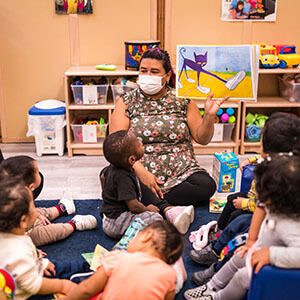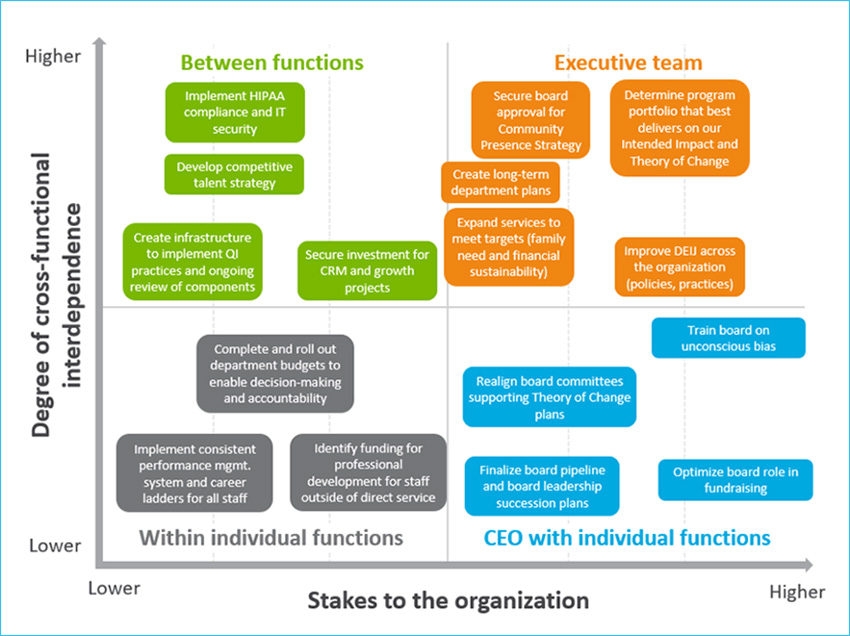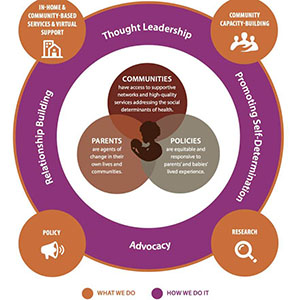Maternity Care Coalition
Reducing Racial Inequities and Improving Health for Parents and Babies
Participating in Bridgespan’s Leading for Impact® program helped Maternity Care Coalition clarify its community-building priorities.
Across the United States, Black mothers frequently face difficulty during pregnancy and postpartum care. Challenges can range from needing knowledgeable assistance during a high-risk pregnancy, securing the services of a doula, obtaining lactation support, or finding culturally competent medical professionals. Navigating these and other medical issues contributes to the documented health disparities women of color face during pregnancy and throughout life, and at the root of many Black mothers’ birth outcomes lie systemic racism and social inequities.
In Montgomery County—often abbreviated as Montco, and part of Philadelphia’s northwest suburbs—Montco Mamas is working to change this. An initiative led by Maternity Care Coalition (MCC), a 43-year-old nonprofit in Southeastern Pennsylvania, Montco Mamas seeks to eliminate inequities surrounding race and infant mortality by supporting accessible, high-quality care for Black women and Black birthing people.
Before receiving funding to start Montco Mamas in 2020, MCC worked with other local organizations to identify the reasons for the area’s stark birth and maternal health disparities. A perinatal risk study, conducted between 2018 and 2020, identified a correlation between very low birth weights and infant mortality—ultimately discovering that health disparities in the region are greatest early in pregnancy. To reduce racial inequity, the study concluded, “we need to support Black women in having babies at healthy birth weights.”
As a result of the study, and after consulting with stakeholders—including people who’d experienced pregnancy care in the county—Montco Mamas prioritized three key goals:
- Increase use of maternal and child health professionals such as doulas, home visitors, and lactation professionals.
- Provide targeted education about reproductive health, behavioral and overall health, and parenting that give agency to Black women, Black birthing people, and Black families.
- Increase providers’ understanding of Black women and Black birthing people’s experiences.
“Some women are able to have their baby with a support team including the father or other family members, but there are women who go through their pregnancy journey alone. Montco Mamas wants to make sure that those women, who may not have a strong support system, are provided that structure through our program.”
More broadly, the program seeks to provide a holistic approach to care and engagement. As one Montco Mamas staff member explains: “Some women are able to have their baby with a support team including the father or other family members, but there are women who go through their pregnancy journey alone. Montco Mamas wants to make sure that those women, who may not have a strong support system, are provided that structure through our program.”
The Bridgespan Group recently worked with MCC to help build overall capacity for organizational strategy as well as effectiveness for its programs—among which Montco Mamas is just one noteworthy initiative. MCC serves thousands of pregnant and postpartum people and families each year through a combination of home visits, early childhood care and education centers, workforce development, behavioral health services, and linguistically and culturally responsive health and parenting education for families with children from birth to age 3.
Optimizing Strategy for Impact
 Marianne Fray, President and CEO, Maternity Care CoalitionFollowing a long career in the private sector, Marianne A. Fray took the helm as MCC’s president and CEO in June 2018, just after the nonprofit had created a three-year strategic plan. Yet Fray still felt that more could be done to clarify priorities and goals.
Marianne Fray, President and CEO, Maternity Care CoalitionFollowing a long career in the private sector, Marianne A. Fray took the helm as MCC’s president and CEO in June 2018, just after the nonprofit had created a three-year strategic plan. Yet Fray still felt that more could be done to clarify priorities and goals.
“As I dug into implementing the existing strategic plan,” Fray recalls, “I found myself wondering, ‘Why did we choose these priorities rather than others? Why do we feel that these strategic choices will get us to our destination fastest and have the greatest impact?’” She continues:
"We had goals such as ‘engage in collaborative partnerships’ and ‘build the capacity of our organization.’ I remember thinking, “To what end? If our mission is to improve the health and well-being of mothers, pregnant women, and parenting families, how will we know when we have achieved that? What are some of the specific measures and outcomes that enable us to know that we are achieving our mission?’ I wanted clear outcomes associated with specific goals so that we could hold ourselves accountable for moving the needle.”
From late 2019 to early 2021, Fray and her executive team worked on articulating MCC’s theory of change (TOC) to answer these questions. The result: a TOC that clearly identified the problems MCC was trying to solve, the impact it wanted to achieve, and how it would get there via work at the client, community, and policy levels.
“When you first see an organization’s TOC,” says Mike Ciccarone, a partner in Bridgespan’s New York office who worked closely with MCC, “you don’t always see something this clear on their goals for impact, particularly from a racial equity perspective. This is an organization that’s decades-old and had been doing tons of work—and doing it thoughtfully—but this really helped them anchor on an even sharper definition of what and for who and how.”
Fray found the process of defining the TOC helped her and MCC’s leadership team gain clarity and renewed focus. “Our approach is radically client-centered and collaborative,” says Fray. “We believe families are the experts when it comes to their own experiences. We recognize their strengths and partner with them to remove barriers so we can enable the community and help them achieve their goals.”
MCC puts these practices into action in its programs for stakeholders and community members. At Montco Mamas, for example, “lived experience experts”—their title for women from the Philadelphia communities they seek to serve—play a prominent role in designing Montco Mamas’ programs. As an MCC staff member describes: “I believe it is important to include the lived experience experts in every decision that we make because they are the motivation and reason that we are doing this work in the first place.”
Building Capacity Through Community Partnership
With its TOC in place, MCC signed up to join Bridgespan’s Leading for Impact (LFI), an 18-month program designed to help nonprofit executive teams boost their effectiveness and amplify impact. “The combination of individual coaching and group discussion in the LFI program really appealed to me,” Fray explains. “I extract value from other people’s insights, so having an opportunity for my team to work with the leadership teams at eight other organizations, and then also having a personal coach for me as a CEO—that was the best of both worlds for me.”

Maternity Care Coalition's Early Head Start model helps prepare children for school.Ciccarone helped facilitate MCC’s LFI cohort and served as Fray’s personal coach. While many organizations use the LFI program to develop and clarify their TOC and intended impact, Ciccarone says, the work MCC had already done in those areas meant the organization could focus its LFI activities on one specific element within its TOC: community capacity building. “As we rolled up our sleeves,” Ciccarone recalls, “I asked, where can Bridgespan be helpful to you? They knew community capacity building had to be part of their approach. They already had a couple examples, like Montco Mamas, but they hadn’t codified it and formalized it.”
MCC recognized it can have the greatest positive impact by combining direct service with initiatives to convene and lead more community partnerships. Since the maternal and child health needs in the community MCC serves are bigger than any one organization could hope to solve on its own, community capacity building helps extend the organization’s reach. For example, MCC trains and then pays community members to become doulas and breast/chest-feeding peer counselors in its Perinatal Community Health Worker program. It has also spearheaded a multi-hospital task force to help local hospitals obtain baby-friendly certification, which has led to those hospitals further collaborating on other issues (such as coordinating obstetric care during the pandemic).
Through workshops, research projects, whiteboarding, and iterative discussions, participation in LFI helped MCC codify and define best practices for evaluating and working with new potential community partners.
Transformational Leadership in Service of Families
LFI also helped MCC become more disciplined in its organizational leadership practices, such as by holding regular weekly meetings where MCC’s leaders use the RAPID decision framework to determine who should be involved in major decisions and what role they should play. “Thanks to LFI,” Fray says, “we now solicit input from more stakeholder groups so that we do not make decisions in a vacuum.”
“Through the cohort aspect of Leading for Impact, I built personal relationships with other nonprofit CEOs. I found the diversity of the cohort organizations mind-expanding. I learned a lot from my peers–but I also loved the LFI work with my own executive team and the one-on-one coaching element. The blending of these different modalities made the information I learned in the program that much stickier.”
Fray calls one particular LFI exercise transformational. “Mike led [my leadership team] through an exercise where we mapped our priorities to identify high-stakes projects and figure out who was in the best position to push those projects forward—myself as CEO, the whole executive team, a single functional unit, or multiple functions working together,” she says. “The resulting two-by-two matrix chart [see below] has catalyzed conversations at our executive retreats and led straight to the development of the RACI charts that we use to determine who is responsible, who is accountable, who should be consulted, and who just needs to be kept informed about progress on various initiatives.”

An executive team decision matrix from Bridgespan's Leading for Impact program. (Click the image to enlarge.)
Ultimately, the LFI program helped MCC clarify its top organizational priorities and focus its resources on high-impact community-partnership initiatives. For example, MCC’s work with Bridgespan led to the creation of a 15-member Community Advisory Board focused on collaboratively building bridges between MCC and the communities it serves. “Using their expert facilitation skills,” Fray says, “our Bridgespan advisors reframed questions and uncorked blockages that helped us identify better solutions.”
Looking back over the experience, Fray says, participating in LFI allowed MCC to build its capacity for fostering community and strengthened its decision-making process—all of which have helped it achieve progress on a range of metrics associated with maternal health and child wellness. “Every topic gave us exactly what we needed to strengthen our team performance so that we could uplift more families in our communities.”
Photos courtesy of Maternity Care Coalition.

